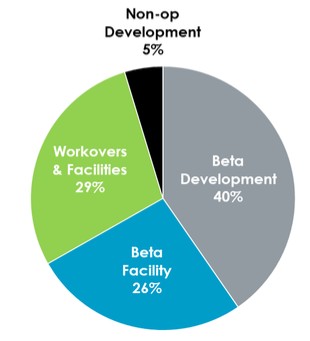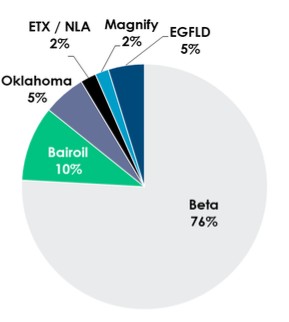Our business is subject to climate-related transition risks, including fuel conservation measures, technological advances and increasing public attention to climate change and environmental matters, which could reduce demand for oil and natural gas and have an adverse effect on our business, financial condition and reputation.
Increasing attention from governmental and regulatory bodies, investors, consumers, industry and other stakeholders on responding to climate change, together with fuel conservation measures, alternative fuel requirements, incentives to conserve energy or use alternative energy sources, and development of, and increased demand from consumers and industry for, lower-emission products and services (including electric vehicles and renewable residential and commercial power supplies) as well as more efficient products and services, increasing consumer demand for alternatives to oil and natural gas (including wind, solar, nuclear, and geothermal sources as well as electric vehicles), societal expectations on companies to address climate change, investor and societal expectations regarding voluntary climate-related disclosures, and technological advances in fuel economy and energy transmission, storage, consumption and generation devices (including advances in wind, solar and hydrogen power, as well as battery technology), could reduce demand for oil and natural gas. Such initiatives or related activism aimed at responding to climate change and reducing air pollution, as well as negative investor sentiment toward our industry and the impact of the changing demand for oil and natural gas services and products may have a material adverse effect on our business, financial condition, results of operations, cash flows, and ability to access capital.
The oil and natural gas industry, and energy industry more broadly, is characterized by rapid and significant technological advancements and introductions of new products and services using new technologies. As others use or develop new technologies, including technological advances in fuel economy and energy generation devices or other technological advances that could reduce demand for oil and natural gas, we may be placed at a competitive disadvantage or may be forced by competitive pressures to implement new technologies at substantial costs. We may not be able to respond to these competitive pressures or implement new technologies on a timely basis or at an acceptable cost. If one or more of the technologies we use now or in the future were to become obsolete, our business, financial condition or results of operations could be materially and adversely affected.
Moreover, parties concerned about the potential effects of climate change have directed their attention at sources of funding for energy companies, which has resulted in certain financial institutions, funds and other sources of capital, restricting or eliminating their investment in oil and natural gas activities. Some investors, including investment advisors and certain sovereign wealth funds, pension funds, university endowments and family foundations, have stated policies to disinvest in the oil and gas sector based on their social and environmental considerations. Certain investment banks and asset managers based both domestically and internationally have announced that they are adopting climate change guidelines for their banking and investing activities. Institutional lenders who provide financing to energy companies such as ours have also become more attentive to sustainable lending practices, and some may elect not to provide traditional energy producers or companies that support such producers with funding. Certain other stakeholders have also pressured commercial and investment banks to stop financing oil and gas production and related infrastructure projects. Such developments, including environmental activism and initiatives aimed at limiting climate change and reducing air pollution, could result in downward pressure on the stock prices of oil and gas companies, including ours. This may also potentially result in a reduction of available capital funding or higher cost of capital for potential development projects, as well as the restriction, delay or cancellation of infrastructure projects and energy production activities, ultimately impacting our future financial results.
Negative public perception regarding us and/or our industry resulting from, among other things, concerns raised by advocacy groups about climate change, may also lead to increased litigation risk and regulatory, legislative, and judicial scrutiny, which may, in turn, lead to new state and federal safety and environmental laws, regulations, guidelines and enforcement interpretations. In addition, claims have been made against certain energy companies alleging that GHG emissions from oil and natural gas operations constitute a public nuisance or have caused other redressable injuries under federal and/or state common law. While our business is not a party to any such litigation, we could be named in actions making similar allegations. An unfavorable ruling in any such case could adversely impact our business, financial condition and results of operations.
Governmental authorities exercise considerable discretion in the timing and scope of permit issuance and the public may engage in the permitting process, including through intervention in the courts. Negative public perception could cause the permits we need to conduct our operations to be withheld, delayed, or burdened by requirements that restrict our ability to profitably conduct our business. In addition, various officials and candidates at the federal, state and local levels, have made climate-related pledges or proposed banning hydraulic fracturing altogether. More broadly, the enactment of climate change-related policies and initiatives across the market at the corporate level and/or investor community level may in the future result in increases in the Company’s compliance costs and other operating costs and have other adverse effects (e.g., greater potential for governmental investigations or litigation). For further discussion regarding the transition risks posed to us by climate change-related regulations, policies and initiatives, see the discussion below in “—Climate change legislation or regulations restricting emissions of “greenhouse gases,” or GHGs, could result in increased operating costs and reduced demand for the oil and natural gas that we produce, while the physical effects of climate change could disrupt our production and cause us to incur significant costs in preparing for or responding to those effects.”

